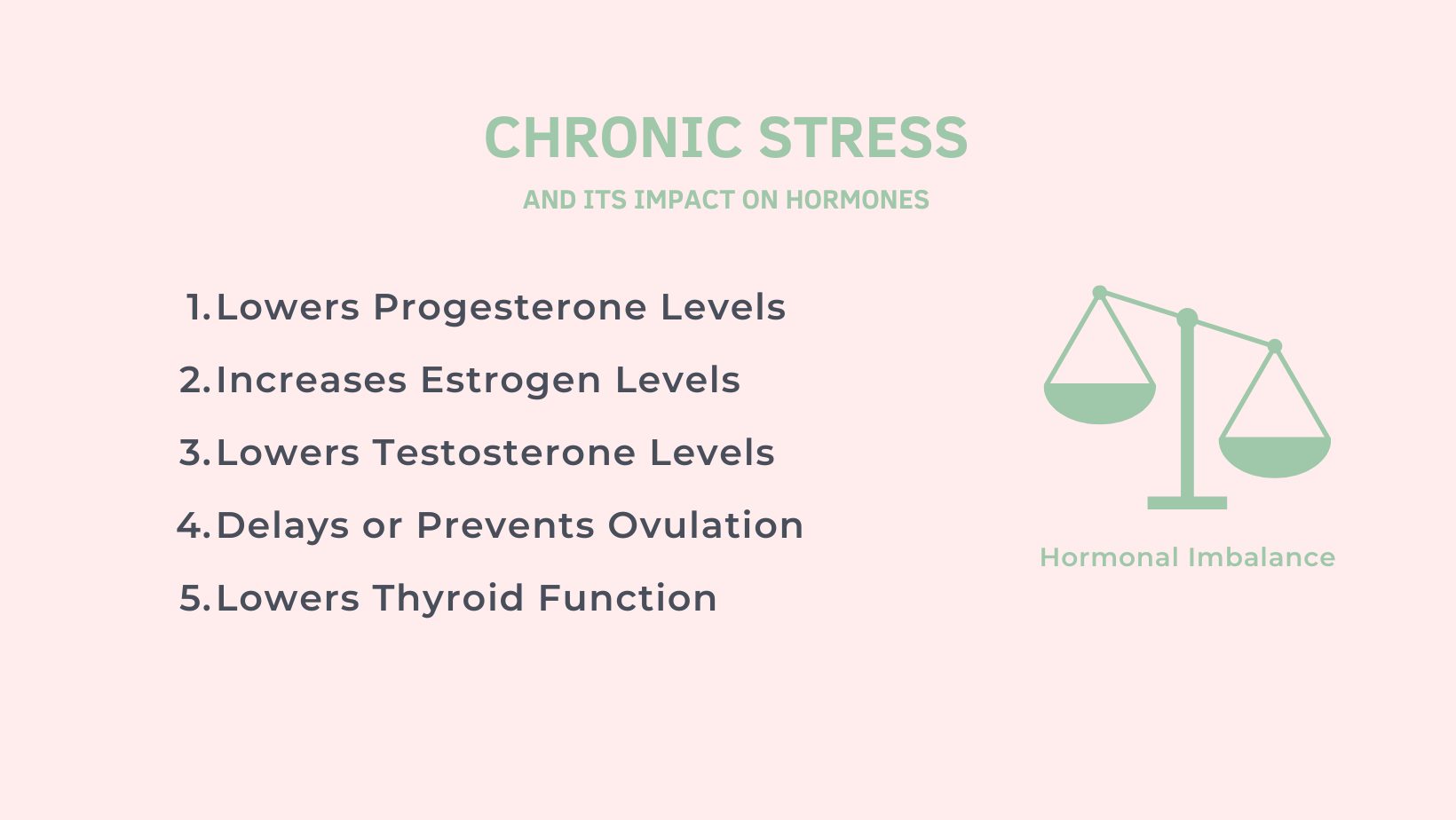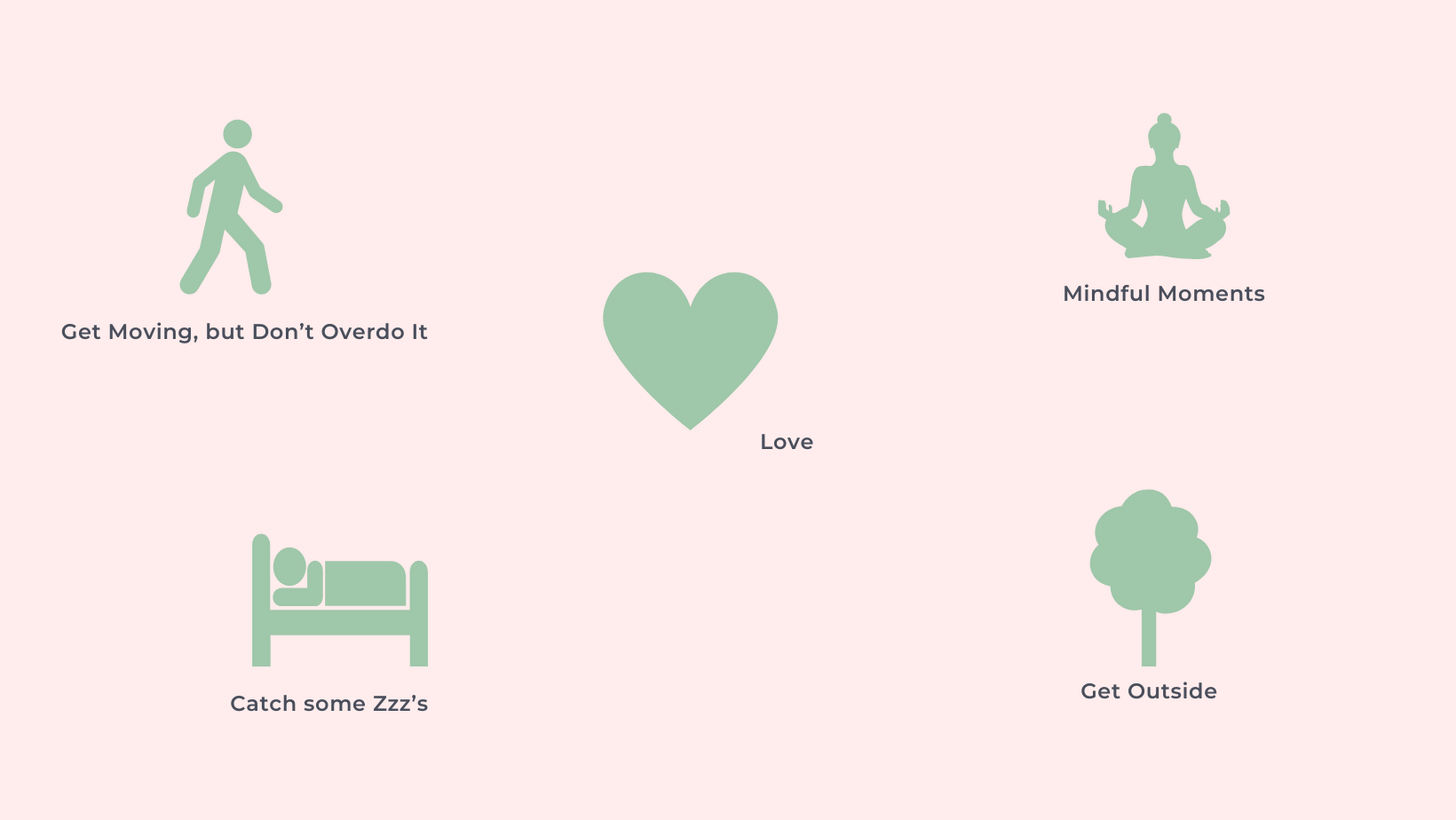Cortisol Levels and Your To-Do List

(Imagine) you're a woman in your mid-30s. Your friends compliment you on your time-management skills and wonder how you do ALL this. You enjoy your work and manage your own team. You love to meet friends for dinner or brunch, and always listen if your friends need you. For your "sanity," you squeeze in workouts whenever you can, even if it means getting up at 5:30 am, and maybe you even have your own family with their own little demands.
But things have changed lately. Despite your efforts to live healthy, you've noticed weight gain around your belly. Your ab workouts don't show the results you're used to. You also feel tired, even though you're getting enough sleep.
You are wondering what is going on. Because you're interested in women's health you've noticed more buzz about menopause. You've also been receiving adds of companies addressing menopause. Are your symptoms and experiences the early signs of menopause?
Maybe. But most likely, it's something else. While I am not a doctor, I have an idea what's going on with you, and that's also what I told the two ladies who approached me.
Nope, it's not Menopause. Also, not pregnancy.
It May Be Your Cortisol Levels
It could be your cortisol levels playing tricks on you due to chronic stress, even though you may not feel stressed in a negative way because you enjoy what you do.
Since some of you might feel seen by the scenario above, I want to use this post to explain cortisol, why it matters, and how we can keep it in check.
Why? Because cortisol is our stress hormone, it might play a bigger role in your life than you realize, especially when you are super busy enjoying life. The good news is that you and each of us can take steps to lower cortisol levels and get back to feeling your best energetic self.
I discussed cortisol briefly in this blogpost and explained the different levels of cortisol during the day and why the timing of drinking your coffee matters. But let's do a quick refresher on cortisol first.
What is Cortisol?
Cortisol often gets a bad rap as the "stress hormone," but it actually plays a much bigger role in our bodies. It helps regulate our sleep-wake cycle (hence the relationship with coffee), combats inflammation, supports a healthy metabolism, and keeps our blood sugar in check (it rises blood sugar when we're running low on energy).
In short, cortisol is like that super-organized friend who keeps everything running smoothly.
But here's the tricky part: both too little and too much cortisol can throw things off balance. If your cortisol levels are too low, you might experience weight loss, extreme fatigue, and even dizziness. On the flip side, too much cortisol can lead to weight gain, high blood pressure, and a whole host of other issues.
Chronic stress affects our hormones, which THEN leads to the symptoms we experience as a result.
Chronic Stress

Lowers Progesterone Levels
All of our steroid hormones, including progesterone, estrogen, testosterone, DHEA and cortisol, are made from a precursor hormone called pregnenolone. Chronic cortisol secretion requires more of the precursor hormone pregnenolone and “steals” this hormone, primarily from progesterone, causing low progesterone levels. Low progesterone then may cause symptoms like PMS is a common hormonal imbalance associated with symptoms ranging from PMS to fertility problems.
Increases Estrogen Levels
When cortisol lowers progesterone levels by both stealing the precursor pregnenolone and reducing the effectiveness of progesterone in cells, this can lead to estrogen dominance (progesterone is needed to keep estrogen levels in check). This is another common hormonal imbalance that is often associated with symptoms such as heavy and painful periods and cyclical acne.
Lowers Testosterone
Chronic stress exposure can block androgen receptors and lead to a decrease in testosterone production necessary for a healthy menstrual cycle, fertility, libido and mood.
Delays or Prevents Ovulation
Chronic cortisol production tells your ovaries to naturally decrease estrogen and progesterone production and de-prioritize ovulation, a process that requires lots of nutrients and energy, in order to devote resources to a much higher priority potential life or death situation (which we know is often not the case). Ovulation is THE cornerstone of a healthy menstrual cycle (you can't have a true period without it) and is also needed for progesterone production, not to mention a necessary part of conception.
Lowers Thyroid Function
When cortisol levels are chronically elevated, they signal the thyroid gland to stop producing as much thyroid hormone. It also hinders the conversion of the inactive thyroid hormone T4 into the active thyroid hormone T3, which the thyroid cells can actually use. This leads to hypothyroidism and symptoms such as weight gain, hair loss, constipation, and heavy or absent periods.
In addition to these hormonal imbalances, chronic cortisol secretion can also lead to increased inflammation and blood sugar instability, decreased muscle mass, impaired digestion and depletion of nutrients, and stress on our liver, all of which can contribute to the symptoms mentioned above.
How to Lower Cortisol?
Keep in mind, the goal isn’t to have low cortisol levels or rid our body of stress hormones but rather to address any root causes of high cortisol in order to promote a healthy cortisol balance and rhythm in the body, which is essential to looking and feeling our best.

- Get Moving, but Don’t Overdo It: Regular moderate exercise like brisk walking or yoga can help lower cortisol levels. But be careful not to overtrain, as intense physical stress can actually increase cortisol. This means that in busy times, it's okay if you don't set the alarm at 4:30 am to get in a run before sunrise.
- Catch Some Zzzs: Aim for 7-8 hours of quality sleep each night. Try to keep a consistent sleep schedule, and create a restful environment with blackout curtains and a white noise machine if needed, or practice your own body scan.
- Mindful Moments: Incorporating mindfulness practices like meditation can significantly reduce cortisol levels. Even just a few minutes a day can make a big difference. It could also be that you pause, and enjoy your food with all your senses, or watch the leaves dance in the wind. (like my little one).
- Nature Breaks: Spending time outside can have a calming effect and lower cortisol. Whether it's a walk in the park or a weekend hike, nature is a natural stress reliever.
- Laughter and Love: Don't underestimate the power of laughter and companionship. Watching a funny movie or spending time with loved ones can lower cortisol levels and lift your spirits.
Listen to Your Body
Ladies, our bodies are amazing, and they often tell us when something is off. If you’re feeling like what I have described above, it might be worth looking into your cortisol levels. There are several ways to test cortisol, from blood tests to at-home saliva kits.
Remember, it took time for your cortisol levels to get out of whack, so be patient and kind to yourself as you work towards rebalancing them. With the right steps, you can regain your energy, improve your mood, and support your overall health.
Stay fabulous, and take care of yourselves!
